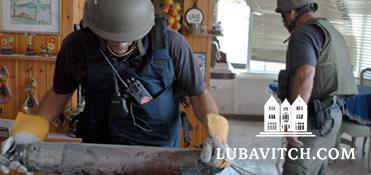Nine thirty p.m., Tuesday, in Akko, where homes have been barraged by katyusha attacks, Chabad representatives, Rabbis Natan Oirechman, Yosef Makmel and Avi Harosh gather round a desk for their nightly meeting at the Baal Shem Tov synagogue.
Streams of people, unnerved by the screaming report of rockets slicing through the atmosphere, on their way to Haifa, have been swirling around Rabbi Oirechman all day. Some need money to relocate their families to interior, southern, presumably safer cities in Israel. Others ask for guidance, the right prayers to say throughout the uncertainty, for a morsel of serenity as bomb warning sirens wail. ‘Our synagogue is the only one still open all day,’ said Rabbi Makmel.
Israelis’ defiant resilience mounts when challenge is known, riding buses to thumb their noses at suicide bombers, but now it’s different. What was thought to be a one or two day offensive is stretching into a longer confrontation. Unabated missile attacks are striking areas normally, relatively untouched by ongoing battles. Undeclared, unnamed, the unknown is taking a psychological toll on the people of Israel.
‘Every night we make a decision for the next day,’ said Rabbi Makmel. Food deliveries to families huddled in home-based bomb shelters along with visits to community members, tefillin at the ready, will continue. Plans for Shabbat candle distribution, should the tension continue through the week, are discussed.
Chabad, no stranger to responding to the havoc of terrorist attacks, is grappling with the unknown as well. With 230 centers throughout Israel, Chabad centers are uniquely positioned to offer help locally, as needed. Chabad’s Terror Victims Project (TVP, www.chabadisrael.com) runs nonstop these days. Visiting parents mourning the deaths of their sons, scrambling for homes to care for children with wounded parents, TVP director Rabbi Menachem Kutner’s days stretch into the late night hours. A call from a Chabad representative in Haifa, a target for Hezbollah bombing raids, sent TVP on a toy-buying mission. Children cooped up in bomb shelters are at once wild with worry and frantic with boredom. ‘The children are very scared. Toys help,’ said Rabbi Kutner. Chabad representatives brought dolls and blocks to children in Naharia, Safed and Kiryat Shemona as well.
Farther north, in Safed, Chabad representative Rabbi Chaim Kaplan estimates that 70% of the community has evacuated. Colel Chabad, one of the oldest humanitarian organizations in Israel, has placed individuals and families without connections in safer havens. Mattresses and blankets, distributed by Chabad to families staying in public bomb shelters, bring comfort over the long hours of tense waiting. A group of 80 boys at a Chabad-run camp in Safed have been shifted to Kfar Citrin, beyond a katyusha’s range, though close enough to hear the frightening booms.
Sara Kaplan, sent with her husband, the late Rabbi Aryeh Leib Kaplan, by the Lubavitcher Rebbe, of blessed memory, in 1973 to revitalize Jewish life in Safed, was pained to disperse a group of young women from Machon Alta, a women’s yeshiva in the city. ‘This summer there was amazing group of girls, Israelis and Americans,’ said Kaplan. ‘It was really blossoming, it was a shame to see them scattered.’
Katyushas have not spared Chabad representatives. In Tiberias, a Katyusha ripped through living room of the parents of Chabad of Golan Heights representative Rabbi Israel Haber. ‘You can’t believe the devastation,’ said Rabbi Haber. ‘The walls, the furniture, appliances, windows were all blown out. The miracle was my parents were not home.’ Sara Kaplan’s son Rabbi Chaim Kaplan and his wife, Rivky Kaplan, Chabad representatives in Safed, had their apartment destroyed by a missile. In a separate attack, a rocket destroyed Rabbi Kaplan’s car as he drove, wounding him and sending him to the hospital, briefly, for treatment.
Commuting between family members bunking in Lod and Kfar Citrin, Rabbi Kaplan is succinct in summing up the role the world’s Jewish community can play to help Israel right now. ‘The bottom line is: if you need to buy food, blankets, to relocate people you need money.’ Readers wishing to support Chabad of Israel’s Terror Victims Program may donate online by clicking here.

Be the first to write a comment.